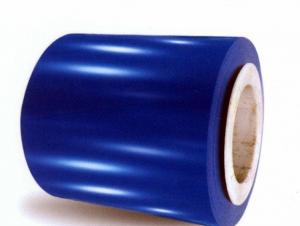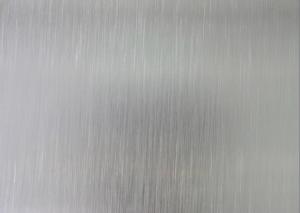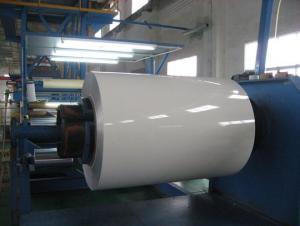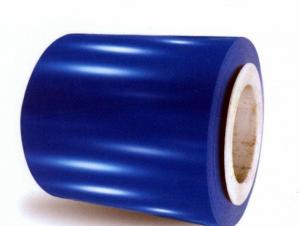PE Coated Aluminium Coils for Decoration Blue AA3003
- Loading Port:
- China Main Port
- Payment Terms:
- TT or LC
- Min Order Qty:
- -
- Supply Capability:
- -
OKorder Service Pledge
OKorder Financial Service
You Might Also Like
1.Structure of Product Description
PE Coated aluminium coils are widly used in decoration field.For example, it can used in ceiling, wall curtain ect. For the painting kinds, it depends on the using evironment. If you use in the open air, we recommend the PVDF coated aluminium coils. This kind of painting can last 15-20 years. If you use in the room, we recommend PE coated aluminium coils. The price is much cheaper than PVDF.
2. Main features of the product
a.Competitive price---We have our own mills and can produce mill finished aluminium coils, so we can control the production cost better.
b.Professional after-sale service---We have more than 15 years exportation experience and you need not worry about the exporation problems.
c.Fast delivery time---We can control the delivery time within 35 days.
3. Image
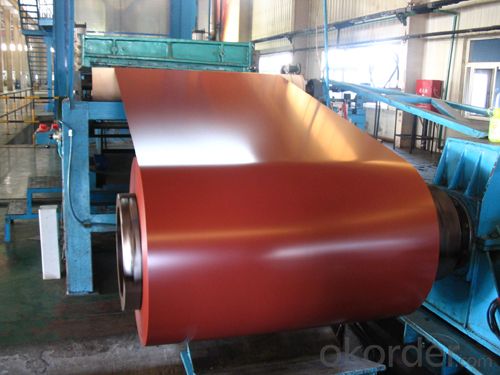
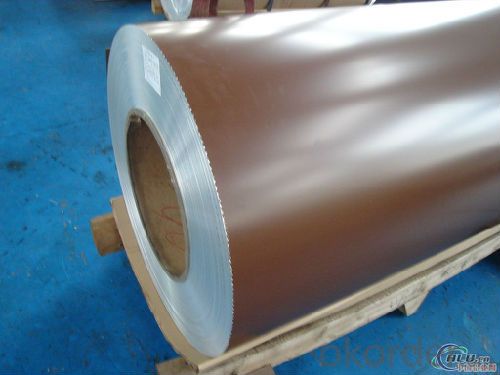
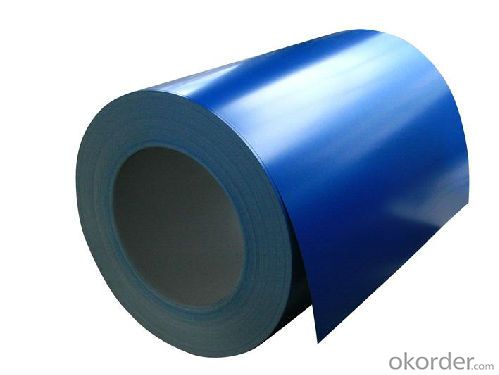
4.Products Specifcation
| Alloy | Temper | Color | Coil ID | Coated Thickness |
| AA3003 | H14 | PE Blue | 505mm | 22-25 microns |
5. FAQ
What is the quality standard?
---Usually our standard is GB3880-2006
What is the largest width?
---It is 2300mm
What is the MOQ?
---Usually we can accept 80 tons.
- Q:How do aluminum coils compare to magnesium coils in terms of strength?
- Aluminum coils are generally stronger than magnesium coils in terms of strength.
- Q:What are the potential applications of coil-annealed aluminum coils?
- Coil-annealed aluminum coils possess a wide array of potential applications across diverse industries. One example lies within the automotive sector, where these coils can be utilized to fabricate lightweight parts and components for vehicles. The inherent lightness of aluminum renders it an ideal material for enhancing fuel efficiency and reducing emissions. This makes it possible to manufacture body panels, chassis components, and structural parts for automobiles. Another field that can benefit from coil-annealed aluminum coils is the construction industry. These coils can be employed in the production of roofing, siding, and wall cladding materials. The corrosion-resistant properties of aluminum render it a suitable choice for applications exposed to outdoor elements, where durability is paramount. Furthermore, the lightweight nature of aluminum simplifies handling and installation, thereby mitigating labor and transportation costs. The packaging industry also holds promise for coil-annealed aluminum coils. Aluminum proves to be an excellent material for food and beverage packaging due to its non-toxic, odorless, and impermeable attributes. Consequently, these coils can be utilized to manufacture cans, foil wraps, and pouches, providing a safe and hygienic packaging solution. Furthermore, the electrical and electronics industry can leverage coil-annealed aluminum coils. Aluminum boasts exceptional electrical conductivity, making it suitable for power transmission lines, electrical components, and heat sinks for electronic devices. Its lightweight nature further facilitates handling and installation in various electrical applications. In summary, coil-annealed aluminum coils offer versatility, durability, and lightweight properties that make them an excellent choice for a multitude of manufacturing needs across various industries. From automotive to construction, packaging to electrical, the applications for these coils are diverse and far-reaching.
- Q:Are aluminum coils resistant to oil and grease?
- Yes, aluminum coils are generally resistant to oil and grease. Aluminum has a natural resistance to corrosion and is not easily affected by most solvents, including oil and grease. This property makes aluminum coils a suitable choice for various applications where they may come into contact with oils or greases, such as in the automotive and HVAC industries. However, it is important to note that prolonged exposure to certain aggressive chemicals or high concentrations of oil or grease may still cause some damage or degradation to the aluminum coils over time. Therefore, it is recommended to properly clean and maintain the coils to ensure their optimal performance and longevity.
- Q:Are aluminum coils suitable for roofing?
- Yes, aluminum coils are suitable for roofing. Aluminum is a lightweight and durable material that is resistant to corrosion, making it an excellent choice for roofing applications. It is also highly reflective, which can help to reduce energy costs by keeping the building cooler. Additionally, aluminum coils are easy to install and maintain, making them a popular option for both residential and commercial roofing projects.
- Q:Can aluminum coils be used for electronic enclosures?
- Yes, aluminum coils can be used for electronic enclosures. Aluminum is a commonly used material for enclosures due to its lightweight, durability, and excellent electrical conductivity. Additionally, aluminum coils can be easily formed and shaped to fit specific electronic components, making them a suitable choice for electronic enclosures.
- Q:How much fluorocarbon and polyester paint should be used in production of aluminum coil and aluminum-plastic panel?
- In theory, one kilogram paint can spray 6 square kilometers for your required thickness. Then you can calculate the total areas.
- Q:How are aluminum coils protected against corrosion during storage?
- Aluminum coils are protected against corrosion during storage through various methods and precautions. One common method is the application of a protective coating or film on the surface of the coils. This coating acts as a barrier, preventing moisture and oxygen from coming into direct contact with the aluminum, which helps to prevent corrosion. Another method is the use of desiccants or moisture-absorbing materials. These materials are often placed inside the packaging or storage containers with the aluminum coils to absorb any moisture that may be present. By reducing the moisture content in the storage environment, the risk of corrosion is significantly minimized. In addition, proper storage conditions play a crucial role in protecting aluminum coils against corrosion. Storing the coils in a dry, well-ventilated area away from direct sunlight and other sources of moisture is essential. It is also important to ensure that the coils are stored off the ground and away from any chemicals or substances that could potentially cause corrosion. Regular inspections and maintenance are also necessary to prevent corrosion during storage. This includes checking for any signs of damage or wear on the protective coating and promptly addressing any issues that may arise. Additionally, maintaining a clean storage environment free from dust, dirt, and other contaminants will help in preserving the integrity of the protective coating and preventing corrosion. Overall, a combination of protective coatings, moisture-absorbing materials, proper storage conditions, and regular maintenance is essential for effectively protecting aluminum coils against corrosion during storage. These measures help to ensure that the coils remain in optimal condition and are ready for use when needed.
- Q:What are the different types of surface coatings for aluminum coils?
- Aluminum coils can be treated with various surface coatings, each serving different purposes. These coatings safeguard the aluminum against corrosion, improve its appearance, and enhance its durability. The most common surface coatings for aluminum coils are as follows: 1. Polyester: Polyester coatings are widely favored for their ability to retain color and resist fading. They provide a smooth, glossy finish and are commonly employed in architectural applications. 2. Polyvinylidene Fluoride (PVDF): PVDF coatings are highly durable and weather resistant. They exhibit exceptional resistance to UV radiation, chemicals, and abrasion, making them suitable for outdoor use and harsh environments. 3. Epoxy: Epoxy coatings possess good adhesion and chemical resistance. They find frequent application in industrial settings where corrosion protection is vital, such as chemical processing plants and marine environments. 4. Polyurethane: Polyurethane coatings are renowned for their durability and resistance to abrasion. They are often utilized in high-traffic areas or applications where the aluminum surface is subject to frequent contact or wear. 5. Acrylic: Acrylic coatings offer reliable weather resistance and color retention. They provide a smooth, glossy finish and are commonly used in architectural and decorative applications. 6. Plastisol: Plastisol coatings, a type of vinyl coating, exhibit excellent corrosion resistance and flexibility. They are frequently employed in applications where the aluminum surface must withstand bending or forming without cracking or peeling. It is essential to consider that each coating type has its own unique properties and advantages. The selection of the coating will depend on specific application requirements, including the desired level of corrosion resistance, aesthetic preferences, and environmental conditions.
- Q:What is the maximum temperature aluminum coils can withstand?
- The maximum temperature that aluminum coils can withstand depends on several factors, including the specific alloy of aluminum and the intended application of the coils. Generally, aluminum has a melting point of around 660 degrees Celsius (1220 degrees Fahrenheit). However, aluminum coils used in various industries such as HVAC (heating, ventilation, and air conditioning) systems and electrical appliances are typically designed to operate within a temperature range of -30 to 150 degrees Celsius (-22 to 302 degrees Fahrenheit). These temperature limits ensure that the aluminum coils maintain their structural integrity and do not experience any significant degradation or damage. It is important to consult the manufacturer's specifications or guidelines for the specific aluminum coils in question to determine their maximum temperature tolerance.
- Q:What are the common surface preparation methods for aluminum coils?
- The common surface preparation methods for aluminum coils include cleaning, degreasing, etching, and conversion coating.
1. Manufacturer Overview |
|
|---|---|
| Location | |
| Year Established | |
| Annual Output Value | |
| Main Markets | |
| Company Certifications | |
2. Manufacturer Certificates |
|
|---|---|
| a) Certification Name | |
| Range | |
| Reference | |
| Validity Period | |
3. Manufacturer Capability |
|
|---|---|
| a)Trade Capacity | |
| Nearest Port | |
| Export Percentage | |
| No.of Employees in Trade Department | |
| Language Spoken: | |
| b)Factory Information | |
| Factory Size: | |
| No. of Production Lines | |
| Contract Manufacturing | |
| Product Price Range | |
Send your message to us
PE Coated Aluminium Coils for Decoration Blue AA3003
- Loading Port:
- China Main Port
- Payment Terms:
- TT or LC
- Min Order Qty:
- -
- Supply Capability:
- -
OKorder Service Pledge
OKorder Financial Service
Similar products
New products
Hot products
Related keywords
